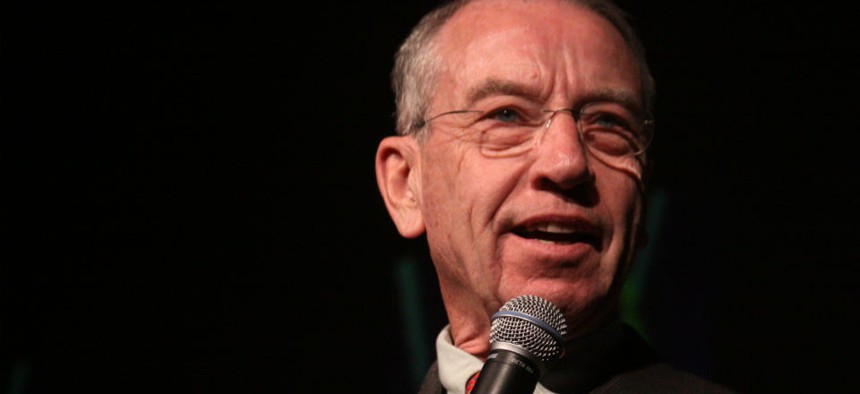
Sen. Chuck Grassley, R-Iowa, has asked GAO to determine how widespread the use of private emails by special government employees is. Flickr user Gage Skidmore
Senator Seeks Answers on Use of Private Email by Special Government Employees
At State Department, Hillary Clinton communicated with aides still in private sector.
Among the many questions raised by former Secretary of State Hillary Clinton’s use of a personal email account for work is agency treatment of “special government employees.”
This personnel category was created by Congress in 1962 in recognition of “the need to apply appropriate conflict of interest restrictions to experts, consultants and other advisers who serve the government on a temporary basis”—not to exceed 130 days a year—but who may retain their private-sector jobs, investments and benefits, according to the Office of Government Ethics.
When the current Clinton email controversy broke in early March, newly installed Senate Judiciary Committee Chairman Chuck Grassley, R-Iowa, was reminded that the State Department had not answered his June 2013 queries on email accounts of special government employees.
“The public's business ought to be public with few exceptions,” Grassley said in a statement on Saturday. “When employees are allowed to serve the government and the private sector at the same time and use private email to do it, the employees have access to everything and the public, nothing. The public is in the dark. The State Department and the Clinton circle need to answer for any blurring of the lines between public and private service and any concealing of the blurred lines through private email.”
Clinton’s special government employees, as reviewed by The Washington Post on Tuesday, included adviser Huma Abedin, former campaign manager Maggie Williams, former Clinton pollster Jeremy Rosner, former Clinton speechwriter Jonathan Prince, former Maryland Lt. Gov. Kathleen Kennedy Townsend and former White House deputy counsel Cheryl Mills.
Grassley has asked the Government Accountability Office to determine how widespread the use of private emails by special government employees might be around the government. A GAO spokesman told Government Executive it is too early to know when the report might be ready.
In a March 3 statement, Grassley explained that his interest in the State Department’s handling of special government employees stemmed from news reports in 2013 about a firm called Teneo with connections to former Clinton associates. “I asked for all records relating to communications between the State Department and Teneo and the State Department and any clients or entities represented by Teneo,” he said. “The State Department was slow to respond on all aspects of my letter and never provided any correspondence involving Teneo.”
The reason given Grassley for the lack of a response was that he was then the ranking member and not the chairman of the Judiciary panel. “If top State Department officials are conducting government business on private email, the content might never see the light of day,” Grassley said. “A measure of accountability and transparency is lost. The State Department should fulfill my request from June 2013.”
Grassley also called for the Financial Crimes Enforcement Network at the Treasury Department to respond to his earlier inquiry on employee use of unofficial email to discuss whistleblower allegations. And he reiterated past criticism of private email use by current Labor Secretary Thomas Perez when he was assistant attorney general for civil rights at the Justice Department.
Separately, State Department spokeswoman Jen Psaki on Tuesday told reporters that 300 private-account Clinton emails totaling 900 pages that have already been turned over to the House Select Benghazi Committee are being redacted for national security and privacy protections and will be posted online for the public. State’s review of the 55,000 pages that Hillary Clinton recently turned over “will take several months,” she said. “Email is an imperfect process, and we will continue to take steps to improve how it is done across the federal government,” Psaki added.
The State Department did not immediately respond to questions about Grassley’s concerns.
Correction: The information about "special government employees in the second paragraph of this article was originally attributed to the Office of Special Counsel, not the Office of Government Ethics. The article has been updated to correct the error.
(Image via Flickr user Gage Skidmore)







